Symbolic Meaning of Egypt in Bible: Spiritual Journey!
In biblical narratives, Egypt consistently emerges as a complex symbol reflecting diverse theological themes. Initially, it serves as a sanctuary, highlighting God’s protective grace and provision during famine or danger (Genesis 12:10; Matthew 2:13-15).
Conversely, Egypt becomes emblematic of bondage and oppression, illustrating divine testing and ultimate deliverance through the Exodus (Exodus 1-14). Egypt also represents worldly allure and moral compromise, cautioning against reliance on material or earthly powers over divine provision (Isaiah 31:1).
The prophetic literature and New scripture further deepen these layers, portraying Egypt as both a place of refuge and judgment, inviting reflection on God’s sovereignty and salvation history.
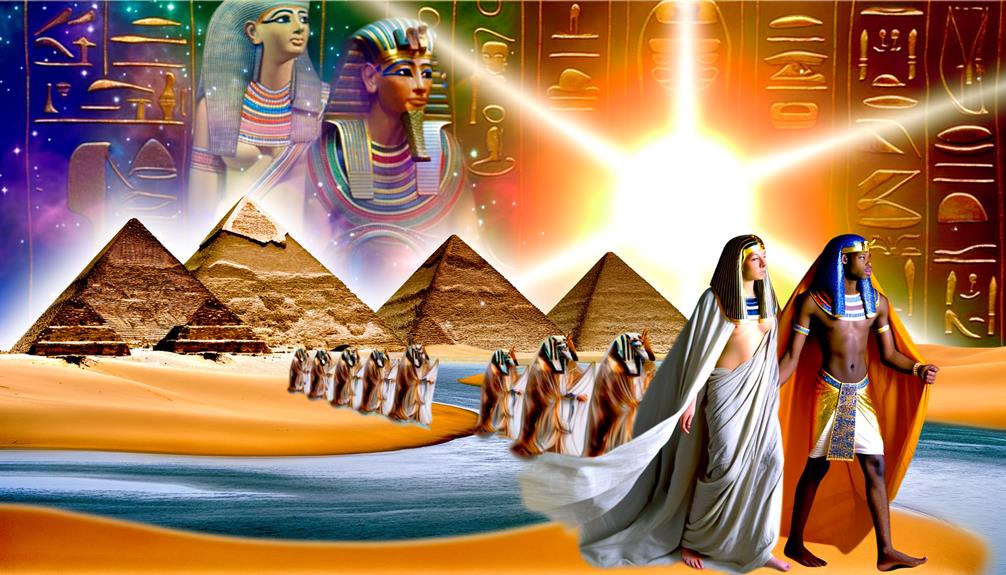
Key Takeaways
- Egypt symbolizes both refuge and oppression, showing God’s protective grace and the adversities faced by the Israelites.
- Joseph’s rise to power in Egypt highlights divine providence and the fulfillment of God’s plan.
- The Exodus from Egypt epitomizes divine deliverance and redemption from bondage.
- Plagues against Egypt represent divine judgment and the assertion of Yahweh’s supremacy over false gods.
Symbolic Meaning of Egypt in the Bible: Bondage, Power, and Transformation
| Aspect | Explanation |
|---|---|
| Bondage | Egypt symbolizes slavery and oppression, particularly in the story of the Israelites’ captivity (Exodus 1:13-14) |
| Worldly Power | Represents wealth, power, and earthly kingdoms, often contrasted with God’s spiritual kingdom (Isaiah 31:1) |
| Place of Refuge | Egypt is also a place of temporary refuge, as seen when Joseph’s family and later Jesus fled there (Genesis 46:3; Matthew 2:13-15) |
| Transformation | Symbolizes a journey of spiritual growth, as the Israelites were transformed through their exodus from Egypt (Exodus 14:30-31) |
| Idolatry and Rebellion | Often associated with idolatry and defiance against God’s will (Ezekiel 20:7) |
Egypt as Refuge
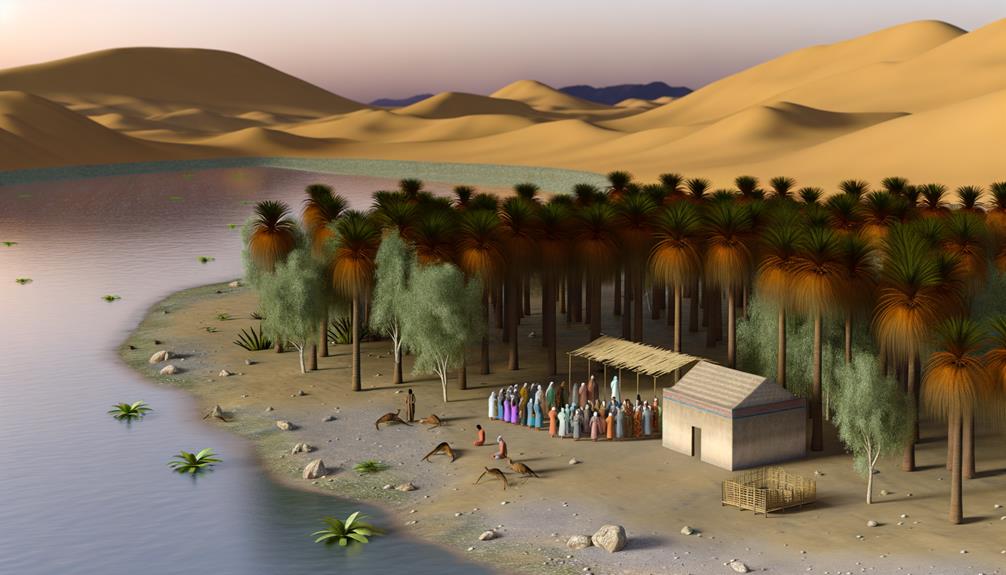
In the biblical narrative, Egypt often serves as a place of refuge during times of famine, danger, and divine intervention. This theme is evident in stories like that of Abraham, who sought sustenance in Egypt during a severe famine (Genesis 12:10).
Likewise, Joseph’s ascent to power in Egypt ultimately provided refuge for his family from widespread hunger (Genesis 41-47).
Furthermore, Egypt becomes a sanctuary for the infant Jesus and His family, fleeing Herod’s massacre (Matthew 2:13-15).
Theologically, Egypt symbolizes God’s provision and protective grace, even in foreign lands.
Contextually, these accounts highlight the recurring motif of God orchestrating refuge through Egypt, underscoring divine sovereignty and faithfulness amid human adversity.
Land of Bondage

While Egypt initially represents refuge in the Bible, it also becomes synonymous with bondage and oppression, especially as seen in the Israelites’ enslavement under Pharaoh.
The land that once offered sustenance during famine transforms into a crucible of suffering, symbolizing the adversities faced by God’s chosen people.
Theologically, Egypt’s shift from sanctuary to prison highlights a narrative of divine testing and deliverance.
Contextually, this period of bondage is pivotal, demonstrating the Israelites’ reliance on God for liberation.
The Exodus, consequently, emerges as a cornerstone event, reinforcing themes of faith, redemption, and covenant.
In this light, Egypt embodies both the perils of earthly dependence and the promise of divine salvation.
Joseph’s Rise in Egypt
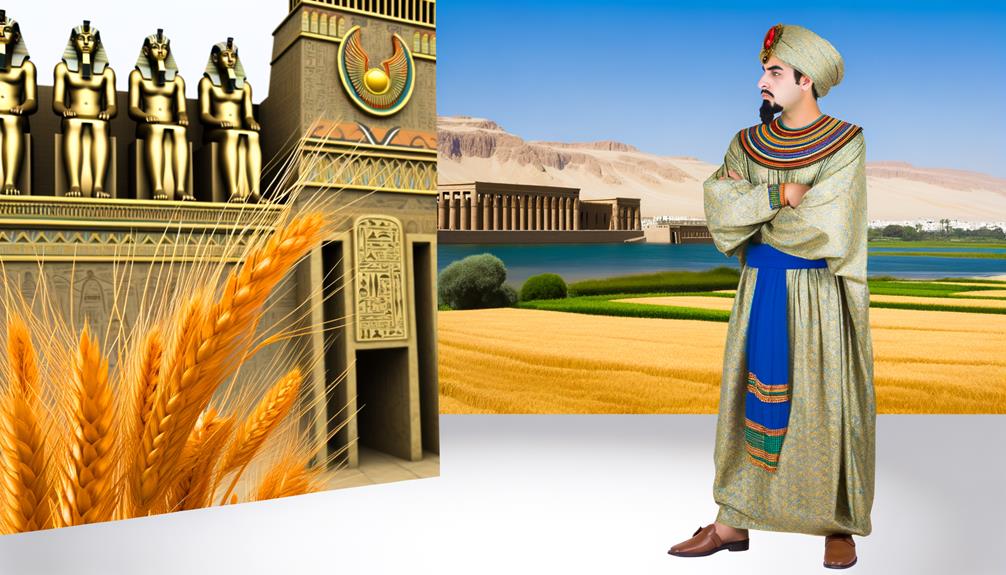
Joseph’s rise to power in Egypt serves as a profound demonstration of divine providence and the unfolding of God’s plan amidst human adversity. Betrayed by his brothers and sold into slavery, Joseph’s journey from imprisonment to becoming Pharaoh’s right-hand man is emblematic of resilience and divine intervention.
His ascension not only preserved Egypt during a severe famine but also facilitated the survival of the Israelite lineage. This narrative underscores the theological theme of God’s sovereignty and the mysterious ways through which His purposes are achieved.
| Aspect | Detail | Significance |
|---|---|---|
| Betrayal | Sold by brothers | Human adversity |
| Imprisonment | Falsely accused | Testing and refinement |
| Interpretation of Dreams | Pharaoh’s dreams | Divine gift and providence |
| Rise to Power | Second to Pharaoh | Fulfillment of God’s plan |
| Preservation | Saved Egypt and Israelite family | Continuation of the covenant |
Moses and the Exodus

The narrative of Moses and the Exodus encapsulates a profound theological message, emphasizing the struggle against Pharaoh’s oppressive tactics and the subsequent divine intervention through the plagues.
This series of cataclysmic events serves as a manifestation of God’s judgement against Egypt, culminating in the Red Sea deliverance that symbolizes ultimate liberation.
These elements collectively highlight the shift from bondage to freedom, underscoring the broader theme of redemption central to biblical theology.
Pharaoh’s Oppression Tactics
Pharaoh’s utilization of oppressive tactics against the Israelites, as detailed in the narrative of Moses and the Exodus, serves as a profound representation of systemic injustice and divine deliverance.
Theologically, his policies of forced labor and infanticide highlight the extent of human cruelty and the abuse of power.
Contextually, Pharaoh’s actions aimed to subjugate and dehumanize the Israelites, reducing them to mere tools of economic exploitation.
Yet, these very conditions set the stage for a divine intervention that would liberate the oppressed.
The narrative underscores the tension between earthly authority and divine justice, illustrating how systemic oppression precipitates a divine response of liberation and justice, ultimately affirming the Israelites’ identity and destiny as God’s chosen people.
Plagues as Divine Judgement
In the context of the Exodus narrative, the plagues serve as a multifaceted divine judgement against both the Egyptian deities and the oppressive socio-political structures embodied by Egypt.
Theologically, each plague systematically dismantles the authority of specific Egyptian gods, thereby asserting Yahweh’s supremacy.
Contextually, the plagues also target the economic and social systems that facilitated the enslavement of the Israelites. For instance, the Nile turning to blood disrupts agricultural and daily life, symbolizing the lifeblood of Egyptian society under divine scrutiny.
The plagues culminate in the death of the firstborn, directly challenging Pharaoh’s divine status and the future of Egypt’s power structure.
Consequently, these divine acts are both a condemnation of idolatry and a liberation from systemic oppression.
Red Sea Deliverance
Following the series of plagues, the climactic event of the Red Sea deliverance epitomizes the ultimate act of divine intervention and liberation for the Israelites. This pivotal moment not only signifies physical deliverance from Egyptian bondage but also symbolizes spiritual salvation and covenantal faithfulness.
Theologically, the parting of the Red Sea represents God’s supreme power over creation and His unwavering commitment to His chosen people. Contextually, it marks the shift from a state of oppression to one of freedom and divine guidance, as the Israelites journey towards the Promised Land.
The event underscores themes of redemption and divine justice, showcasing the Lord’s ability to deliver His people from insurmountable odds, thereby reinforcing their identity and trust in Him.
Egypt in Prophecy
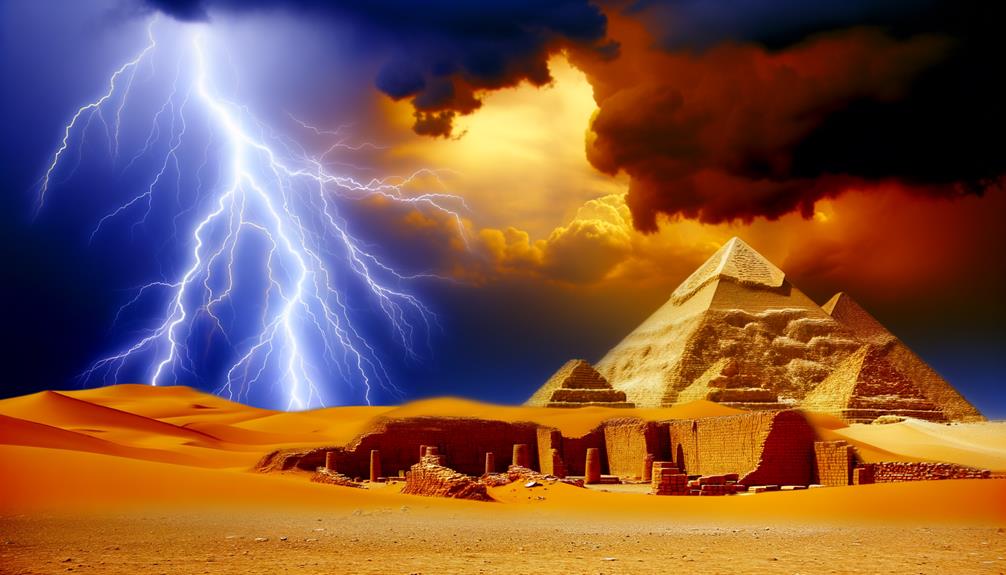
Throughout biblical prophecy, Egypt frequently symbolizes both a place of refuge and a source of impending judgment, reflecting its complex role in the spiritual narrative of the Israelite people.
Prophets like Isaiah and Ezekiel articulate Egypt’s dual significance, portraying it as a sanctuary during times of distress and as a nation destined for divine retribution. This duality underscores the ambivalence in the relationship between Israel and Egypt, serving as a theological metaphor for reliance and betrayal.
- Isaiah’s prophecies: Egypt as a future site of divine retribution.
- Ezekiel’s visions: Egypt’s downfall as a symbol of God’s sovereignty.
- Hosea’s reflections: Egypt as a refuge during Israel’s infancy.
- Jeremiah’s warnings: Egypt as a false hope for security.
Symbol of Worldliness
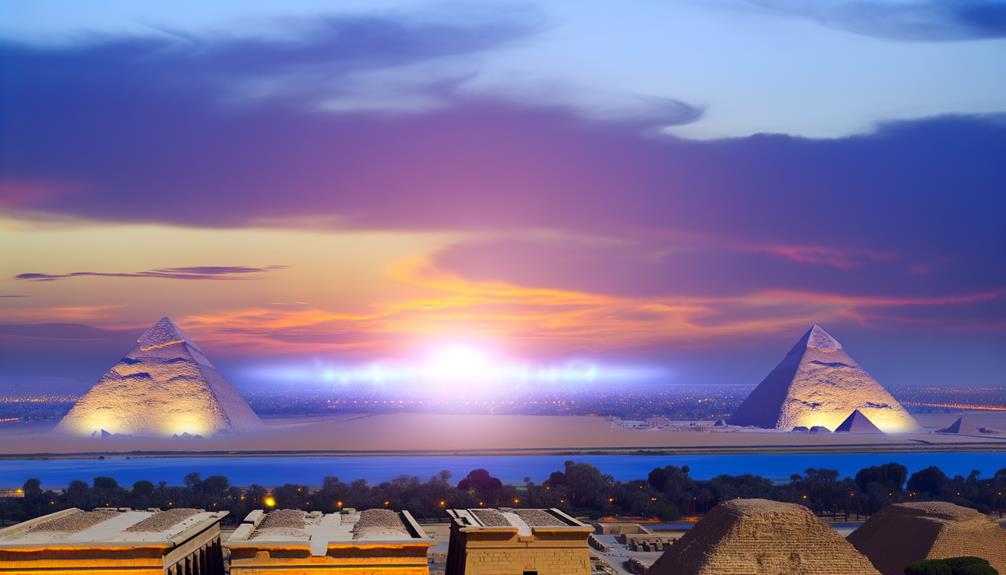
Egypt often epitomizes worldliness in biblical literature, representing a life driven by materialism, idolatry, and moral compromise.
The Israelites’ sojourn in Egypt is frequently depicted as a period of spiritual regression, where they were exposed to the allure of Egyptian wealth and the pantheon of gods. This portrayal underscores a broader theological narrative: Egypt as a symbol of human reliance on earthly power and sensual pleasures, contrary to divine will.
For instance, Isaiah 31:1 warns against seeking refuge in Egypt’s chariots and horsemen instead of trusting in God.
Therefore, Egypt’s emblematic status serves as a cautionary tale, urging believers to transcend worldly temptations in favor of spiritual fidelity and obedience to divine commandments.
Spiritual Lessons From Egypt

The narrative of Egypt in the Bible presents profound spiritual lessons, particularly in the areas of bondage and liberation, testing of faith, and divine providence.
Egypt symbolizes both the physical and spiritual captivity of the Israelites, highlighting the human condition and the necessity of divine intervention for true freedom.
Furthermore, the experiences of the Israelites in Egypt serve as a proof of the testing of faith and the overarching providence of God, offering timeless insights into the relationship between humanity and the divine.
Bondage and Liberation
In examining the narrative of bondage and liberation within the biblical context, Egypt emerges as a profound symbol of both physical and spiritual captivity, offering a rich tapestry of lessons on divine deliverance and human resilience. This duality underscores pivotal themes in biblical theology, reflecting the Israelites’ journey from enslavement to freedom under God’s providence.
Egypt epitomizes the harsh conditions of bondage, serving as a powerful symbol of oppression.
The plagues and the Exodus illustrate God’s power and willingness to liberate, highlighting divine intervention in the plight of the Israelites.
The endurance of the Israelites showcases their human resilience, emphasizing faith and perseverance throughout their struggles.
Liberation leads to a covenantal relationship with God, indicating a significant moral transformation for the people.
Furthermore, Egypt symbolizes the spiritual enslavement from which faith in God offers freedom, functioning as a profound spiritual metaphor in the biblical narrative.
Testing of Faith
Moving from the narrative of liberation, the sojourn in the wilderness reveals how the trials faced by the Israelites served as a profound testing of faith, refining their dependence on divine guidance.
The harsh conditions of the desert—marked by scarcity of food and water became a crucible for spiritual growth, compelling the Israelites to trust in God’s provision. This period of testing highlighted their wavering faith, seen in episodes of doubt and rebellion.
Theologically, these experiences symbolize the believer’s journey through spiritual desolation towards ultimate reliance on God. Contextually, the exodus narrative underscores that faith, when tested, transforms into a steadfast conviction, essential for overcoming life’s adversities. Biblically, the Israelites’ 40-year journey through the desert represents a time of trial and testing, leading them to rely fully on God for sustenance and guidance. In addition, the biblical significance of 288 is seen in the 12 tribes of Israel being multiplied by 24, representing the 24 elders or leaders in the New Testament, signifying the unity and leadership within the community of believers. This speaks to the idea that spiritual desolation ultimately leads to a deeper reliance on God and a stronger sense of community and unity among believers.
Consequently, Egypt’s symbolic journey becomes a template for understanding faith’s maturation through trials.
Divine Providence
Through the narrative of Egypt, multiple layers of divine providence unfold, illustrating God’s unwavering commitment to guiding and sustaining His people amidst adversity. Egypt serves as a crucible where divine intervention is meticulously orchestrated to shape and deliver the Israelites, reinforcing faith and highlighting the perpetual care of the Almighty.
- Joseph’s Rise to Power: A demonstration of divine orchestration in transforming personal tribulation into national salvation.
- Provision during Famine: Demonstrates God’s foresight and provision in times of widespread scarcity.
- Plagues and Deliverance: Symbolize divine justice and the dismantling of oppressive structures.
- The Exodus: Embodies God’s promise of liberation and the journey to covenant fulfillment.
- Sustenance in the Wilderness: Highlights continuous divine care post-deliverance, ensuring survival and growth.
These elements collectively underscore the profound theological principle of divine providence.
Egypt as a Metaphor

Egypt’s symbolic representation in the Bible often serves as a metaphor for bondage, spiritual oppression, and the worldly allure that distracts from divine purpose.
Contextually, Egypt epitomizes the entrapment of the Israelites, underscoring a broader theological concept of enslavement to sin and idolatry.
The narrative of the Exodus highlights the journey from physical captivity to spiritual liberation, illustrating the perils of succumbing to materialism and moral compromise.
Egypt’s portrayal in scriptural texts often contrasts the transient pleasures of earthly life with the enduring fulfillment found in divine obedience.
Consequently, Egypt becomes a profound symbol of the spiritual struggles faced by believers, urging a conscious departure from worldly temptations toward a life aligned with God’s will.
Egypt and Divine Judgement
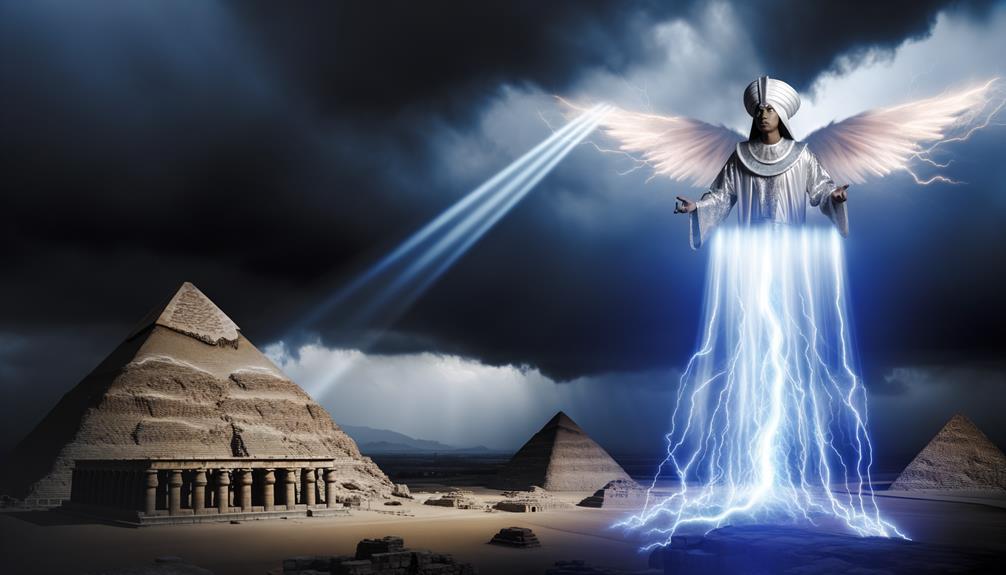
Historically and theologically, Egypt’s role as a recipient of divine judgement in the Bible underscores the themes of justice and retribution. The narrative of the plagues in Exodus epitomizes divine retribution, portraying Egypt as a symbol of oppression and God’s ensuing judgement as a means to uphold justice.
This portrayal is significant because it reflects the broader biblical themes of:
- Divine sovereignty: Showcasing God’s ultimate authority over nations.
- Moral order: Reinforcing the idea that actions have consequences.
- Deliverance: Highlighting the liberation of the oppressed.
- Covenant fidelity: Emphasizing God’s commitment to His promises.
These themes resonate through prophetic literature, enhancing our understanding of divine judgement as both a historical and theological construct.
Egypt in New Testament

In the New Covenant, Egypt emerges as a place of refuge, especially serving as the sanctuary for the Holy Family during their flight from Herod’s massacre, thereby juxtaposing its Old Scripture role as a land of oppression.
This shift symbolizes a transformative divine purpose, illustrating that places once associated with bondage can become havens of protection.
Theological implications abound, suggesting a redemptive narrative where God’s providence operates beyond geographical and historical confines.
Additionally, Matthew 2:13-15 highlights Egypt as a fulfillment of prophecy, indicating divine orchestration.
This nuanced portrayal invites readers to recognize Egypt not merely as a static symbol of past enslavement, but as part of a dynamic, unfolding salvific history within the New Scripture context.
Contemporary Lessons From Egypt

Understanding the contemporary lessons from Egypt requires examining how its biblical symbolism adapts to modern theological contexts, reflecting enduring themes of redemption and divine providence. Egypt, as a symbol, offers valuable insights for contemporary faith practices and spiritual growth.
- Liberation: Egypt represents oppression, and its narrative encourages believers to seek liberation, both spiritually and socially.
- Divine Faithfulness: The Exodus illustrates God’s unwavering commitment to His people, reinforcing faith in divine promises.
- Change: Just as Israel shifted from slavery to freedom, believers are called to personal transformation and renewal.
- Providence: The provision of manna in the wilderness signifies God’s continuous provision for those who trust Him.
- Judgment and Mercy: The plagues and Passover underscore the balance of divine judgment and mercy, guiding ethical and moral choices today.
These elements provide a framework for applying ancient wisdom to contemporary life.
Conclusion
In the biblical narrative, Egypt oscillates between sanctuary and crucible, embodying profound theological dichotomies.
As a haven for Joseph and a crucible of bondage for Israelites, it signifies both divine providence and judgment.
Prophetic texts further imbue Egypt with eschatological connotations, while New Scriptures references recontextualize its symbolism.
Contemporary interpretations must, consequently, navigate these layered meanings, recognizing Egypt’s role as both a historical entity and a rich metaphorical landscape within the scriptural tradition.






